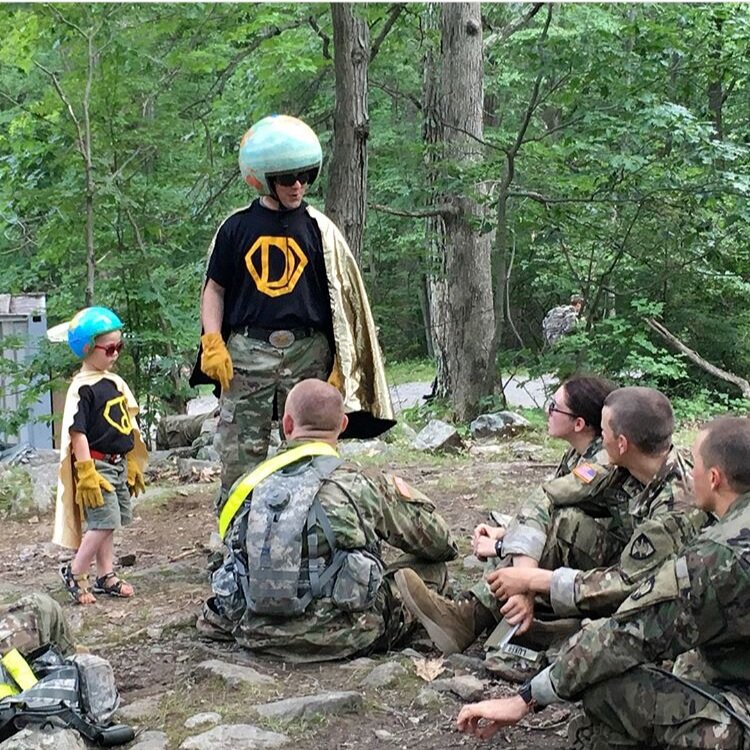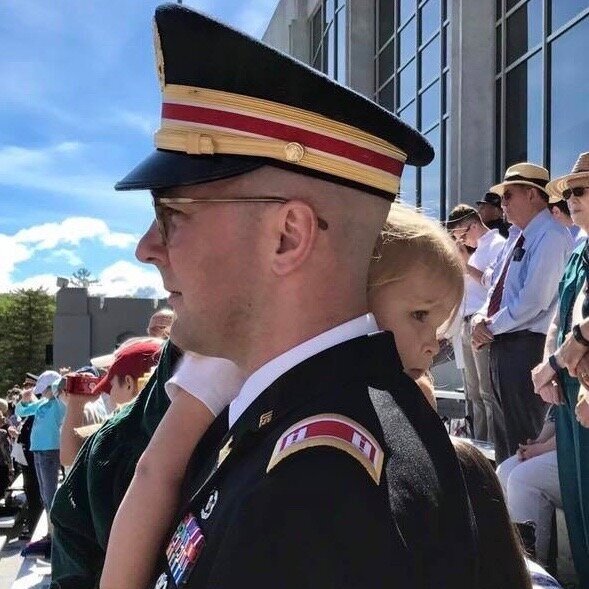The Hat Toss
Friends, among of the things we really esteem around here are our family traditions — the ones we’ve forged during our marriage and those passed down to us from our parents and grandparents.
Why?
Put simply, our traditions are the reference points of our identity.
They connect our present with our past and, hopefully, our future as individuals who belong to a family, a community, and a society.
Now, sometimes we can’t participate in a tradition, say, due to illness, being far away, or a global pandemic.
How, then, do we keep our traditions alive and going?
We tell their stories!
Stories are like a seed bank in the earth, patiently waiting for Spring to germinate.
Stories keep our traditions alive until we can be together again to renew them.
You may have told a story or two about your favorite college basketball team’s greatest win after you heard March Madness had been cancelled this year.
Or maybe you shared your favorite memory from opening day in years past. Or of a memorable St. Paddy’s Day.
Well, friends, we want to share the story of one of our favorite — albeit recent family traditions from our time as an Army family: West Point’s graduation ceremony.
So this doesn’t have much to do with flowers or farming, but we feel pretty strongly that it’s important to tell this story & keep this tradition alive.
As the 1,000 or so graduating Cadets march onto the field in single file, one can’t help but think of “the Long Gray Line” stretching back to the first class admitted in 1802, who have shaped our nation’s history: Presidents and generals like Ulysses S. Grant, Dwight Eisenhower, Omar Bradley, and George S. Patton; Henry Flipper, who was born a slave and rose to command the Buffalo Soldiers; Abner Doubleday, the father of baseball; astronaut, Buzz Aldrin; and many others.
After the commencement address, the name of each of the 1,000 or so members of the graduating class is called.
Each approaches the dais, salutes the Dean, Commandant, or commencement speaker, and receives their diploma.
At some point, here, one of our favorite traditions in the graduation ceremony occurs — recognition of the Goat.
Each year, the graduating class collects a bunch of money for their classmate with the lowest GPA (the Goat) who can graduate — in case they need it later in life...
The money is presented as a bag of cash by the Commandant in front of all the attendees, who may include such notables as the Secretary of the Army, Army Chief of Staff, and whoever is giving the commencement speech — the President, Vice President, Secretary of Defense, or Chairman of the Joint Chiefs of Staff.
At the end of the ceremony, something very special happens — they swear the oath of office: “I do solemnly swear (or affirm) that I will support and defend the Constitution of the United States against all enemies, foreign and domestic; that I will bear true faith and allegiance to the same; that I take this obligation freely, without any mental reservation or purpose of evasion; and that I will well and faithfully discharge the duties of the office on which I am about to enter. So help me God.”
Then, the First Captain — a member of the graduating class who has led the 4,500-member Corps of Cadets for the past year dismisses the graduates, and they toss their white hats into the air.
In the chaos that follows, some of the newly commissioned Second Lieutenants sprint off to find their future spouse for a kiss (some will be married later that day).
But also, the children of staff and faculty, and members of the graduates’ family are allowed to run out onto the field and collect one of those hats.
It’s like the anti-roller-coaster, “You must be this short to ride” experience.
To run onto the field, you must be between 30-48 inches tall.
This is just for the little guys and gals with big dreams, folks.
The kids get to keep the hat, and it’s fun to see them play in them year after year.
But what’s truly special is that each of the hats has something inside — many contain a $20 bill or a wad of cash, but the best ones have a note or a memento from a new Army Officer to the young dreamer.
We want to share one of those notes with you today.
We found it in the hat our son Robert picked up our first year at the Academy. He wrote:
“Dear future cadet, I started this note during Beast (his summer training before Freshman year) and I’ve found my reasons for wanting to serve our country have only grown stronger over the last 4 years.”
Wow.
He continued, “I collected this hat from this field when I was your age. Today I’m tossing it to you. I hope you will pass it on someday, too.”
Have you ever done something hard?
I mean really hard?
Certainly, we all just got a taste of the kind of endurance I’m talking about during lock-down these past eleven weeks.
But I mean something that required you to persevere through adversity for years?
Maybe a major lifestyle change, or a battling an illness or addiction.
Well, that’s exactly what these kids do during their college years. Some for an additional two years of prep school before they’re admitted to West Point.
This year’s graduating class arrived to West Point the same year as Charles.
They were in a kind of lock-down — called Beast Barracks, all summer while Charles was in teaching seminars.
And they weren’t Zooming with family.
It was hot.
They were dirty.
They smelled.
They were tired.
They were learning the fundamentals of the profession of Soldiering — learning what our nation expects them to be: unrivaled experts, relentlessly self-disciplined, unquestionably loyal to our Constitution, and totally worthy of our trust in their character 24/7.
At the end of their first summer, as college freshman across America headed into Welcome Week, this class was accepted into the U.S. Corps of Cadets.
It was the first time these “New Cadets” experienced the unabashed pride of the West Point community for their choice to serve in this way.
We (faculty) even brought them into our homes for ice cream and, finally, a chance to call home and talk to their parents for the first time since they were given 60 seconds to say goodbye almost two months prior.
As Plebes (freshman) they learned that to lead is to serve, to pay meticulous attention to detail, and to be self-disciplined first.
They called minutes in unison with about 1000 of their class — like literally before each meal they stood in doorways and stairwells calling the time for the rest of the Corps like the telephone operator (“At the tone the time will be…”)
They delivered laundry for the rest of the Corps, memorized meal menus, and walked everywhere with their hands cupped and along the walls of the academic building hallways and stairwells.
As Yearlings (sophomores) they became team leaders, guiding and mentoring the next class through the same process of culturization they just completed.
They learned that to be a leader is to be responsible for one’s subordinates, and that the growth and development of one’s subordinates is essential to the long-term success of the organization.
Next, they affirmed their commitment to serve our nation for 5 years on active duty.
At any point up to the moment of Affirmation, they were free to resign and head home or off to a civilian college — no harm, no foul.
After Affirmation, if they leave the Academy, or fail a course and are separated, they must enlist in the Army.
It’s a moment where they commit to — no matter what their rank (lieutenant or private), honorable service to our Nation.
During their Cow (junior) year, which historically was the first time any of them were allowed to travel home, and gave us that phrase, “When the Cows come home” they take on more responsibility for creating and enforcing policy within their Cadet organizations.
Finally, they enter their Firstie (senior) year and, having learned to live honorably. Some become responsible for running the entire, 40-some-hundred-strong U.S. Corps of Cadets under the guidance of officer mentors.
And somehow they find time to dig into their academic discipline and conduct cutting-edge research that returns intellectual capital to our Nation. They play competitive sports, join enriching clubs, and all of them complete internships in organizations across the Army, as well as government agencies and Fortune 500 corporations.
After 47 months, they graduate, having followed and led, and having the forged physical and moral fitness they need to lead young men and women from every walk of life and to build cohesive teams that trust each other and win in combat.
Having seen them grow from the day they arrived at West Point as New Cadets for Beast Barracks, to swearing their oath of office as the Army’s newest Second Lieutenants, to say their commitment to each other and to us all is inspiring is like the understatement of the century.
But this year, like so many young people — not just across our nation but around the globe, they graduate quietly.
They will toss their hats again, but no future Cadets will be there to read their words.
Hopefully, for each of these young men and women, like the Cadet who left a note for our son, Robert, “[their] reasons for wanting to serve our country have only grown stronger over the last 4 years.”
They head off to serve our nation with our trust that they will do so having been formed, like clay — from the valedictorian to the Goat, as leaders of character who will choose to do the right thing, even at the greatest personal cost for no other reason than that it’s the right thing to do.
We are so proud of them!





